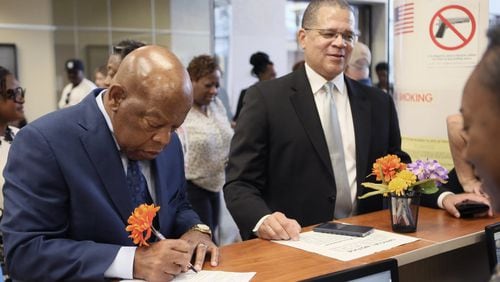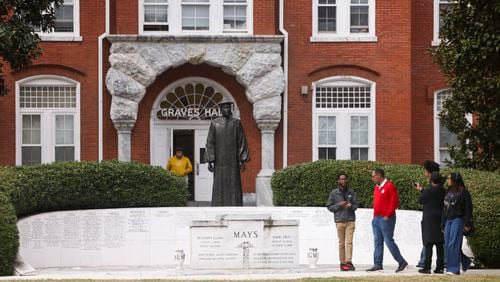Eleven years ago, nearly 240,000 residents lived in unincorporated Fulton County.
Today, that number is closer to 100,000. That’s not because people have left the county. It’s because of the number of cities that have formed, leaving less land unincorporated.
The cityhood movement that has swept across metro Atlanta has the potential to drastically change the role of some county governments. In Fulton County, if voters decide Tuesday to create yet another city, all but a swath of industrial land will be incorporated.
That would put Fulton in the unique position of being the only county that doesn't have responsibility for the day-to-day needs of residents when it comes to things like public safety or land use, said Todd Edwards, the associate legislative director of the Association County Commissioners of Georgia. Instead, Fulton leaders have the chance to become a regional voice within their own county, focusing on step-back problems like transportation needs and a revamping the criminal justice system.
“The county in the future can play the role of collaborator and convener,” Fulton County Chairman John Eaves said.
Though some Georgia counties have consolidated city-county governments, most have plenty of unincorporated areas, where the county government provides so-called city services like those Fulton is currently responsible for in unincorporated south Fulton. In the rest of Fulton County, cities handle parks and policing on their own. While the unincorporated area remains, the county continues to buy fire trucks, graduate officers from its police academy and hear zoning cases.
County governments will always provide services like the courts, jail, sheriff’s office, and tax commissioner, and they will always have the responsibility of conducting elections, Edwards said.
But if commissioners no longer have a say in land use or policing, the county’s role in the minutiae of residents’ daily lives “will shrink significantly,” Edwards said.
“To some extent, it may do the county good,” he said.
Tuesday, residents will vote on forming the City of South Fulton. Other voters who have approved forming new cities have argued that smaller government means a more responsive government. Supporters of the new city say it’s about local control — they believe if they don’t incorporate, the area will be annexed into a neighboring city.
Eaves hasn’t expressed an opinion on the City of South Fulton, but he’s taken steps to expand the role of county government beyond the required services. A decade after the start of the cityhood push, that’s been most evident recently in a series of mayors’ meetings hosted by the county.
This year, the conversations resulted in a proposed three-quarter penny sales tax for transportation that is also on Tuesday’s ballot, but Eaves said those efforts are just “an indicator of where Fulton County is headed.”
The success in getting the transportation tax on the ballot “has proven how the city as a convener can be incredibly effective,” Eaves said.
“It’s a great opportunity for a county to almost work like a regional government,” he said.
Already, the county acts that way when it comes to health services, aging and youth services and libraries.
“I’m actually very excited about that potential role,” Eaves said. “We can be perceived and valued as a collaborator.”
Even though a reputation for dysfunction influenced the spread of the cityhood movement, officials says they are beginning to shed the county’s long-held image. Commissioners work together better than in the past, and they work together better with city officials.
Sandy Springs Mayor Rusty Paul has said he thinks the creation of new cities contributed to the new rapport. No longer is there as much of a tug-of-war when it comes to county services, he said.
Eaves suggested the new good feelings might even lead to more consolidation in the future — perhaps county-wide fire services or greater uniformity when it comes to land use decisions. Already, Fulton County Chief of Police Gary Stiles has taken the lead in an effort to improve police interactions with the mentally ill county-wide.
The role of county government is as a “catalyst,” County Manager Dick Anderson said, and Fulton can continue to exert its influence to help bring others to the table to make things better for residents in all of its cities.
Even if the new city does not form, Fulton will continue to move in this direction. There is a chance that neighboring cities’ annexations will leave Fulton with the same result at some point in the future.
Regardless of what happens, Eaves said he thinks Fulton’s future is “bright.”
“We’re not going away, even if we get out of the municipal services business,” he said. “Frankly, this is uncharted territory. …I do believe Fulton County is evolving right before our eyes.”
About the Author








